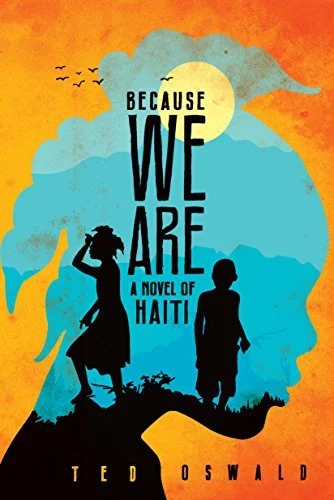Because We Are
Some of you may recall my interview last summer with Ted Oswald, the author of Because We Are: A Novel of Haiti. At the time, Ted was wrapping up an Indiegogo campaign to raise funds to complete the project, as well as to support a number of small nonprofits in Haiti.
The book was published around the new year, but I finally just read it. In the interview Ted said that beyond the commitment to support grassroots organizations in Haiti, he hoped the novel would be rich and compelling enough to stand on its own merits as “an ambitious and emotional story in its own right.” I can now tell you it certainly is just that.
In Because We Are we meet Libète and Jak, two kids from very different backgrounds who become unlikely detectives, intent on pursuing truth and justice in a land, I think it’s safe to say, that is lacking in rule of law (Paul Farmer has much to say about this when he describes “the history of the present illness” in Haiti). This murder-mystery story spans several years, including the days immediately following the earthquake of 2010, but also includes clashes with UN “peacekeepers” and local political campaigning, which reads at times like historical fiction. Coupled with vivid descriptions of the lives of these children and their neighbors, one begins to more fully grasp – not just intellectually, but on a deeper, more emotional register – what life must be like for those living in Cité Soleil, the slum community near Port-au-Prince where much of the story is set. In that regard, this book has similarities to Child of the Dark: The Diary of Carolina Maria de Jesus, a rare first person account of life in a Brazilian favela.
Good novels like Because We Are have a certain power to them, an ability to draw us in, arguably in ways nonfiction seldom can. In this case, Ted humanizes the Haitian people. His characters are not portrayed as angels – the book is too honest and believable for that – but neither are they portrayed as demons. But neither are they reduced to mere statistics, which, frankly, are at times the extent of what we know about those who inhabit places like Haiti. That humanizing effect in and of itself is perhaps Because We Are’s greatest achievement – now, when we hear stories in the news about events in Haiti, we can picture kids like these behind the scenes, kids not entirely unlike the kids we once were.
Once you get through the riveting 400 pages of Because We Are, fear not – the characters live on in two new short stories, The Bloodied Birds and The Kings of Nothing.
